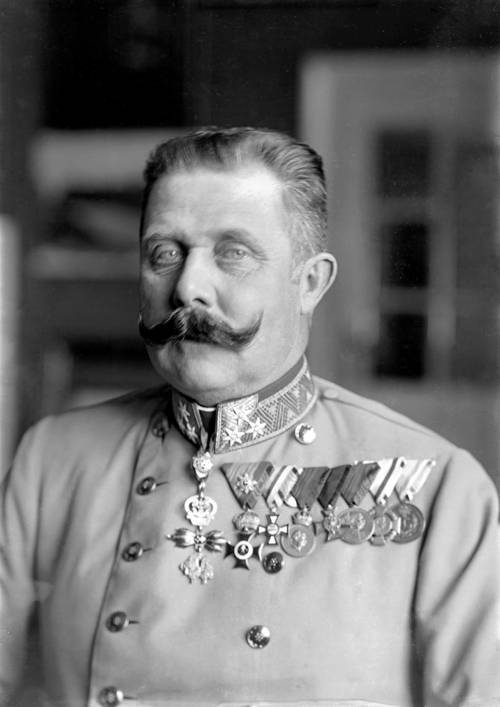
FAQ About Franz Ferdinand (Archduke)

Who was Archduke Franz Ferdinand?
Archduke Franz Ferdinand was a member of the Habsburg dynasty and the heir presumptive to the Austro-Hungarian throne. Born on December 18, 1863, he was the eldest son of Archduke Karl Ludwig of Austria and became the heir after the suicide of Crown Prince Rudolf in 1889. His assassination on June 28, 1914, in Sarajevo is widely considered as the event that triggered World War I.

What was the significance of Franz Ferdinand's assassination?
The assassination of Archduke Franz Ferdinand is often cited as the immediate catalyst for World War I. His murder by Gavrilo Princip, a Bosnian Serb member of the nationalist group Black Hand, led to a chain reaction of political and military mobilizations. Austria-Hungary declared war on Serbia, prompting alliances and conflicts that expanded into a global conflict.

Who assassinated Archduke Franz Ferdinand and why?
Archduke Franz Ferdinand was assassinated by Gavrilo Princip, a member of the Black Hand, on June 28, 1914. Princip and his co-conspirators aimed to end Austro-Hungarian rule over Bosnia and Herzegovina, territories newly annexed by Austria-Hungary, and promote South Slav nationalism through the creation of a united Slavic state.

How did Franz Ferdinand's death lead to World War I?
The assassination led Austria-Hungary to issue an ultimatum to Serbia, which was only partially accepted. This rejection, coupled with complex alliances, resulted in Austria-Hungary declaring war on Serbia. Russia mobilized in defense of Serbia, prompting Germany to declare war on Russia and later on France, leading to a full-scale European and eventually global war.

What were Franz Ferdinand's views on Austro-Hungarian governance?
Franz Ferdinand held progressive views for his time, advocating for governmental reforms within the Austro-Hungarian Empire. He sought greater autonomy for various ethnic groups within the empire, potentially through a federalization plan that might have transformed the dual monarchy into a tripartite monarchy, thereby addressing rising nationalist tensions.

Where and when was Archduke Franz Ferdinand assassinated?
Archduke Franz Ferdinand was assassinated on June 28, 1914, in Sarajevo, which is present-day Bosnia and Herzegovina. He was shot while traveling in a motorcade alongside his wife, Sophie, Duchess of Hohenberg, who was also killed in the attack.

Who was Sophie, Duchess of Hohenberg?
Sophie, Duchess of Hohenberg, was the wife of Archduke Franz Ferdinand. The couple married in 1900, despite opposition due to Sophie’s lower status as a non-dynastic noble. They had three children together and were deeply devoted to each other. Unfortunately, she was assassinated alongside her husband in Sarajevo.

What was the political climate in Europe before Franz Ferdinand's assassination?
Before the assassination of Franz Ferdinand, Europe was already a tense mix of nationalism, militarism, imperial rivalries, and complex alliances. Countries were arming themselves and forming alliances such as the Triple Entente and Triple Alliance, setting the stage for a widespread military conflict.

How did Franz Ferdinand's assassination affect Austria-Hungary's relationship with Serbia?
The assassination significantly deteriorated diplomatic relations between Austria-Hungary and Serbia. Viewing Serbia as complicit, Austria-Hungary issued an ultimatum with harsh demands. Serbia's partial acceptance was rejected, leading Austria-Hungary to declare war on Serbia, igniting the broader war.

What was the Black Hand organization?
The Black Hand was a secret military society formed in 1911, known for its nationalist agenda to unite South Slavs, free from Austro-Hungarian rule. It sought to achieve this goal through espionage, sabotage, and political assassinations, and it played a key role in planning the assassination of Archduke Franz Ferdinand.

How did other countries react to Franz Ferdinand's assassination?
The assassination caused a diplomatic crisis known as the July Crisis. Austria-Hungary, with support from Germany, gave an ultimatum to Serbia, whose response was considered unsatisfactory. This led to a cascade of alliances being activated and mobilizations ordered, with Germany, Russia, France, and eventually Great Britain being drawn into the conflict.

Did Franz Ferdinand have any children?
Yes, Archduke Franz Ferdinand and his wife, Sophie, Duchess of Hohenberg, had three children: Princess Sophie of Hohenberg, Maximilian, Duke of Hohenberg, and Prince Ernst of Hohenberg. After their parents' assassination, the children were not permitted to inherit their father's titles due to the morganatic nature of their parents' marriage.

What was the impact of Franz Ferdinand's assassination on the Austro-Hungarian Empire?
The assassination deepened existing political and ethnic tensions within the Austro-Hungarian Empire, leading to its involvement in World War I. The ensuing war drained resources, exacerbated nationalist movements, and ultimately contributed to the empire's collapse at the end of the war, leading to the creation of several independent nations.

How did Franz Ferdinand's assassination influence military tactics in World War I?
Franz Ferdinand's assassination indirectly led to the adoption of trench warfare and total war strategies during World War I. As nations mobilized and combat fronts stabilized, the war developed into a protracted conflict characterized by trench systems, high casualties, and new military technologies such as machine guns and chemical weapons.

What were the long-term consequences of Franz Ferdinand's assassination?
The assassination set off a series of events leading to World War I, which not only caused immense immediate loss but also led to geopolitical changes and upheavals. The war precipitated the fall of empires, redrew national boundaries, spurred the rise of fascism and communism, and set the stage for World War II.

What would have happened if Franz Ferdinand had not been assassinated?
Speculating on historical 'what-ifs' can be challenging, but some historians believe Franz Ferdinand's survival might have delayed or altered the course of World War I. His federalization ideas for the Austro-Hungarian Empire could have eased ethnic tensions, although the overall climate of nationalism and militarization in Europe might still have led to conflict eventually.

Was Franz Ferdinand involved in military service?
Yes, Franz Ferdinand had an extensive military background. He held various ranks within the Austro-Hungarian Army and was involved in its administration, which allowed him to gain insights into military strategy and reforms. His experiences further shaped his views on military and governmental policies.

How did Franz Ferdinand's assassination influence cultural works?
The assassination of Franz Ferdinand has influenced numerous cultural works, serving as a theme or reference point in literature, films, and historical analyses. Books like "The Guns of August" by Barbara Tuchman and films about World War I often begin with his assassination as the inciting incident for the global conflict.

What role did nationalism play in Franz Ferdinand's assassination?
Nationalism played a central role in the assassination. The assassins sought to create a South Slavic state free from Austro-Hungarian control. Nationalist sentiments were fueled by the empire's annexation of Bosnia and Herzegovina and the broader European nationalist movements striving for self-determination and political autonomy.

How is Franz Ferdinand remembered in history today?
Franz Ferdinand is mostly remembered for his assassination and its pivotal role in triggering World War I. However, he is also recognized for his potential reforms and progressive ideas within the Austro-Hungarian Empire. His murder serves as a historical lesson on the complexities of nationalist politics and alliances.
